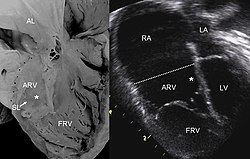Ebstein's anomaly

Editor-In-Chief: Prab R Tumpati, MD
Obesity, Sleep & Internal medicine
Founder, WikiMD Wellnesspedia &
W8MD's medical weight loss NYC, sleep center NYC
Philadelphia medical weight loss and Philadelphia sleep clinics
| Ebstein's anomaly | |
|---|---|

| |
| Synonyms | Ebstein's malformation |
| Pronounce | N/A |
| Specialty | N/A |
| Symptoms | Cyanosis, shortness of breath, heart palpitations, fatigue |
| Complications | Heart failure, arrhythmias, stroke |
| Onset | Congenital (present at birth) |
| Duration | Lifelong |
| Types | N/A |
| Causes | Congenital heart defect |
| Risks | Family history, genetic disorders |
| Diagnosis | Echocardiogram, Electrocardiogram, MRI |
| Differential diagnosis | Tricuspid valve dysplasia, Tetralogy of Fallot |
| Prevention | N/A |
| Treatment | Medication, surgery, catheter ablation |
| Medication | Diuretics, beta blockers, antiarrhythmics |
| Prognosis | Variable, depends on severity |
| Frequency | Rare |
| Deaths | Varies, depending on severity and treatment |
Ebstein's anomaly is a rare heart defect present at birth (congenital). It affects the tricuspid valve, one of the heart's four valves, which prevents blood from flowing back into the right upper heart chamber (atrium) from the right lower heart chamber (ventricle).
Introduction[edit]
In Ebstein's anomaly, the tricuspid valve sits lower than normal in the right ventricle, causing a portion of the right ventricle to become part of the right atrium (atrialization of the right ventricle). This results in a smaller functional right ventricle and may lead to enlargement of the right atrium. The tricuspid valve's leaflets are also abnormally formed, leading to tricuspid regurgitation, where blood leaks back into the right atrium when the right ventricle contracts.
Symptoms[edit]
Symptoms of Ebstein's anomaly can vary greatly from person to person. Some individuals may remain symptom-free, while others may experience symptoms such as shortness of breath, fatigue, a heart murmur, cyanosis (a bluish discoloration of the skin due to low oxygen levels), arrhythmias (irregular heart rhythms), and heart failure.
Causes[edit]
The exact cause of Ebstein's anomaly is unknown. However, it is believed to occur early in the development of the fetus. Some studies suggest a possible link to the use of certain medications during pregnancy, such as lithium and benzodiazepines.
Diagnosis[edit]
Ebstein's anomaly is typically diagnosed through a combination of physical examination, medical history, and imaging tests. These may include an echocardiogram, electrocardiogram, cardiac MRI, and chest X-ray.
Treatment[edit]
Treatment for Ebstein's anomaly depends on the severity of the condition and the presence of symptoms. Options may include medications, cardiac catheterization, or heart surgery. In severe cases, a heart transplant may be necessary.
Prognosis[edit]
The prognosis for individuals with Ebstein's anomaly varies widely. Some individuals may live a normal life without symptoms, while others may require lifelong treatment and monitoring.
Gallery[edit]
-
Diagram of Ebstein's anomaly
-
ECGs in Ebstein's anomaly with Mahaim accessory pathway
-
ECG of Ebstein's anomaly
Ad. Transform your life with W8MD's Budget GLP-1 injections from $49.99


W8MD offers a medical weight loss program to lose weight in Philadelphia. Our physician-supervised medical weight loss provides:
- Weight loss injections in NYC (generic and brand names):
- Zepbound / Mounjaro, Wegovy / Ozempic, Saxenda
- Most insurances accepted or discounted self-pay rates. We will obtain insurance prior authorizations if needed.
- Generic GLP1 weight loss injections from $49.99 for the starting dose of Semaglutide and $65.00 for Tirzepatide.
- Also offer prescription weight loss medications including Phentermine, Qsymia, Diethylpropion, Contrave etc.
NYC weight loss doctor appointmentsNYC weight loss doctor appointments
Start your NYC weight loss journey today at our NYC medical weight loss and Philadelphia medical weight loss clinics.
- Call 718-946-5500 to lose weight in NYC or for medical weight loss in Philadelphia 215-676-2334.
- Tags:NYC medical weight loss, Philadelphia lose weight Zepbound NYC, Budget GLP1 weight loss injections, Wegovy Philadelphia, Wegovy NYC, Philadelphia medical weight loss, Brookly weight loss and Wegovy NYC
|
WikiMD's Wellness Encyclopedia |
| Let Food Be Thy Medicine Medicine Thy Food - Hippocrates |
Medical Disclaimer: WikiMD is not a substitute for professional medical advice. The information on WikiMD is provided as an information resource only, may be incorrect, outdated or misleading, and is not to be used or relied on for any diagnostic or treatment purposes. Please consult your health care provider before making any healthcare decisions or for guidance about a specific medical condition. WikiMD expressly disclaims responsibility, and shall have no liability, for any damages, loss, injury, or liability whatsoever suffered as a result of your reliance on the information contained in this site. By visiting this site you agree to the foregoing terms and conditions, which may from time to time be changed or supplemented by WikiMD. If you do not agree to the foregoing terms and conditions, you should not enter or use this site. See full disclaimer.
Credits:Most images are courtesy of Wikimedia commons, and templates, categories Wikipedia, licensed under CC BY SA or similar.
Translate this page: - East Asian
中文,
日本,
한국어,
South Asian
हिन्दी,
தமிழ்,
తెలుగు,
Urdu,
ಕನ್ನಡ,
Southeast Asian
Indonesian,
Vietnamese,
Thai,
မြန်မာဘာသာ,
বাংলা
European
español,
Deutsch,
français,
Greek,
português do Brasil,
polski,
română,
русский,
Nederlands,
norsk,
svenska,
suomi,
Italian
Middle Eastern & African
عربى,
Turkish,
Persian,
Hebrew,
Afrikaans,
isiZulu,
Kiswahili,
Other
Bulgarian,
Hungarian,
Czech,
Swedish,
മലയാളം,
मराठी,
ਪੰਜਾਬੀ,
ગુજરાતી,
Portuguese,
Ukrainian

